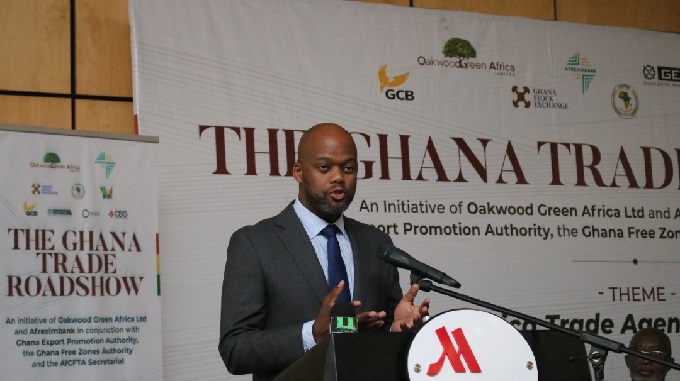
The Secretary General of the African Continental Free Trade Area (AfCFTA), Wamkele Mene has called for the need for African Union member states to embrace the idea of industrialisation if they wish to remain competitive within the global trade space.
According to him, the over reliance on export of the continent’s primary commodities as well as on external partners to come and invest in the continent has brought about the lack of competitiveness.
When you think about why Africa lacks competitiveness, it is because we have been fragmented leading to the continuous reliance on export of our raw materials which are processed abroad and re-exported to us, creating a value chain and employment generation for those countries,” Mene said.
Trade Road Show
Speaking at the opening ceremony of the Ghana Trade Road Show organised by Afriexim Bank and Oakwood Green Africa, an African trade finance group and the AfCFTA Secretariat in Accra on Wednesday, Mene indicated that intra-African business investment presently is less than five percent, while intra-Africa trade stood at around 17 to 18 percent.
Other partners of the event were the Ghana Investments Promotion Centre (GIPC), Ghana Export Promotion Authority (GEPA), the Ghana Freezones Board as well as the GCB and the Consolidated Banks.
Themed, “Supporting the Africa Trade Agenda – Ensuring the Last Mile”, the event attracted representatives from the business community, small and medium enterprises (SMEs) as well as exporters of handicraft products, financial institutions among others.
The three-day event seeks to promote Afriexim mandate in Ghana by forging collaborations with the business community and the SME sectors to increase their competitiveness under the AfCFTA agreement.
The programme also sought to introduce trade finance avenues available under AfCFTA through Afriexim Bank for businesses seeking to undertake ventures to scale up intra-Africa trade.
Fragmentation
The fragmentation of rules among African Union (AU) member states, Mene said, would require the need to focus on industrialisation and its acceleration as such might mean that Africa may not have learned from the Covid-19 experience and the Ukraine situation which is still ongoing.
He counselled that industrialising individually as a nation won’t serve an adequate purpose since the economies of the member states were small, and the fragmentations have not made it possible to achieve the objective of an integrated market.
This is why the AfCFTA is so critical because, regardless of how competitive you are as a nation, the potential of a single country would not make the needed impact that is why we have to leverage on this market of 1.3 billion people if we are going to succeed,” he said.
He emphasised that Ghana, South Africa and some other eight African countries between 2018 and 2019 were among the world’s fastest growing economies, an indication that the potential of the African continent to be globally competitive exists, “but again, without an integrated single market, we are not going to achieve the target of industrialisation, job creation and global and regional competitiveness.
Value Addition
Similarly, he also said value addition has been fundamentally lacking on the continent, necessitating the need to ensure an enhancement of processing capacity.
Citing the Democratic Republic of Congo and the Zambia, which he said have copper in excess as examples, Mene pointed out that whereas these two countries were the leading producers of the raw material, the lack of processing capacity has seen the two countries exporting them to Ukraine where it is processed leaving them to now import them for manufacturing.
In 2019, Africa imported $16 billion worth of pharmaceutical products making it 15 million of jobs and our competitive capacity being exported to the rest of the world, but when you look at the raw materials for the manufacturing of pharmaceutical products, they are mainly agricultural base and these are abundant on our continent,” he said.
Efficient Corridors
He also lamented at what he said were the inefficiencies along the trade corridors within the various regions on the continent which he stressed have eroded not only competiveness in trade but also affect the ease of doing business in Africa.
In West Africa for example, over 70 percent are over reliant on the various corridors, unfortunately, there are inefficiencies with transit of goods between Abidjan to Lagos or Ghana to Lagos taking between 10 to 15 days going through 37 check points, thus creating huge costs for business,” he lamented.
“In East Africa, you can move your goods from the Port of Mombasa to Kampala in three days which is a distance of 1,600 kilometres. What this means is that the East Africans have reduced the transit time over a 10 year period from 15 days to 3 days,” he added, urging member states with bureaucratic processes to reform their processes.
Trade Minister
The Minister for Trade and Industry, Alan Kyerematen in a speech read on his behalf by a Deputy Minister for Trade, Mr. Herbert Krapa indicated that African countries cannot maximise trade amongst themselves without building partnerships within their ranks.
We can no longer remain exporters of the very raw materials whose finished products rule the global economy,” Kyerematen said.
Ghana as host of the AfCFTA Secretariat, and an ever-dependable champion of Africa’s integration agenda, he said, will continue to take very seriously its collaborative role with the Secretariat in driving the single market agenda.

